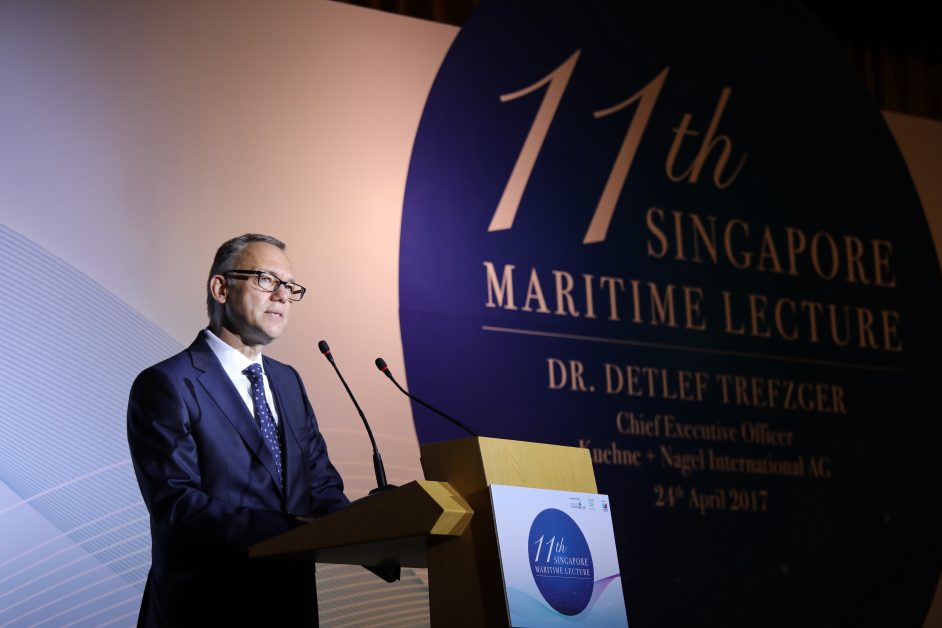[vc_row][vc_column][vc_column_text]Close to 400 senior maritime professionals gathered for 11th annual leadership forum
The annual Singapore Maritime Lecture had 400 senior maritime representatives gleaning insights into the key drivers of today’s logistics industry.
Being a critical element in the global shipping supply chain, developments in the logistics sector hold key lessons for maritime industry players. Additionally, factors driving changes in logistics also mirror those experienced by today’s maritime industry.
The 11th edition of the yearly forum featured a keynote address by Dr Detleft Trefzger, Chief Executive Officer of global freight forwarding and logistics giant Kuehne + Nagel International AG, who spoke on the topic “Driving Forces of the Logistics Industry”. Dr Trefzger is also a member of the International Maritime Centre (IMC) 2030 Advisory Committee.
This was followed by a fireside chat moderated by Professor Annie Koh, Vice President, Office of Business Development and Professor of Finance (Practice), Singapore Management University.
Driving Forces of the Logistics Industry
The first factor that Dr Trefzger spoke about was on the end consumer who has ever-changing needs and will be the ultimate driver of all activities. Demand for delivery on the same or next day, increased access to products from across the world as well as a greater need for transparency of a product’s source, have led to fundamental changes in the design and execution of supply chains – from production to consumption.
The growing middle class in developing Asian nations have also led to shifts in global distribution patterns. Dr Trefzger cited the example of China, which has moved from being an export and production market to a consumption and services country – a signal of the country’s growing middle-class. As such, Dr Trefzger opined that increased volatility in global trade will be a new normal, providing opportunities in the form of new regional growth areas.
As with many other industries, the logistics industry is influenced by technology, data and predictive analytics, which increases capacity and productivity, without additional inefficiency. Success will be dependent on the mastery of these, as information based on real-time data enables customers, partners and logistics providers to make the right decisions.
With technological adoption in the logistics industry and a greater emphasis on knowledge-based activities, manpower would have to keep pace and become increasingly upskilled as “eWarders” equipped with the know-how and experience in predictive analytics and expertise in data-driven supply chain management.
The final factor that Dr Trefzger spoke was on consolidation. While this has brought about fundamental changes in the carrier landscape, there remains expectations and opportunities for transformation. This can be achieved through synchronisation among all players in the logistics industry such as in improving data quality, demand-driven and visibility enabled planning, collaboration, as well as complementary value chains of carriers and forwarders.
To summarise the discussion, Professor Annie Koh noted that keys to the logistics industry’s transformation include – building trust with customers, leveraging technology and talent development. At the same time, industry players must be agile, bold and collaborative.[/vc_column_text][/vc_column][/vc_row]








